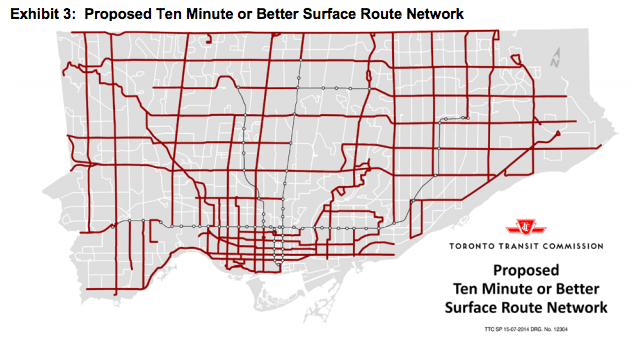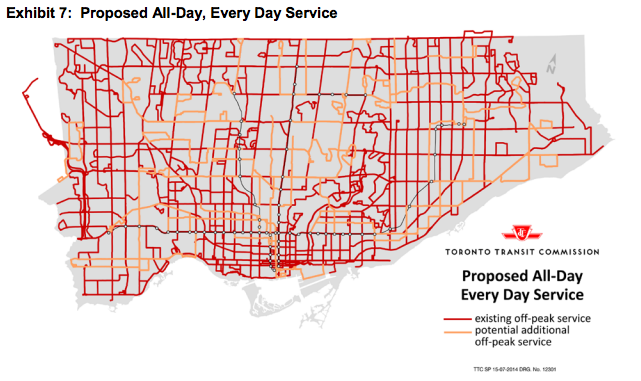The Toronto Transit Commission is pondering the innovative ideas of allowing all-door boarding on streetcars and transfers that would be valid for two hours. These are among the sweeping changes the TTC has proposed in its service expansion plan, Opportunities to Improve Transit Service in Toronto–and these two ideas could be implemented as early as January 2015. Members will consider the report’s nine recommendations at tomorrow’s TTC Board Meeting:
- implement all door boarding and proof-of-payment on all streetcar routes
- reduce wait times and crowding on bus and streetcar routes
- establish a city-wide network of Ten-Minute-or-Better bus and streetcar services
- expand the Express Route Network with new and improved express bus routes
- implement more transit priority measures
- add resources to improve service reliability and route performance
- operate all routes all day, every day across the city
- change the one-trip-per-fare to a two-hour-travel-privilege-per-fare
- expand the overnight bus and streetcar network
Having just returned to Toronto after 3 years in Ottawa, 7 years in Vancouver, and 2 years in Amsterdam, I honestly cannot believe the TTC still expects passengers to use a transfer only for the point of exiting one vehicle/boarding another. It is an archaic system–both OC Transpo (Ottawa) and TransLink (Vancouver) have allowed 150 minute transfers for at least a decade! This allows anyone using transit to run a short errand–picking up groceries, or a child from day care–and get back home on the same fare. All-door boarding is common on express buses in many cities–in Amsterdam, which has double-length streetcars, riders board at the front and middle doors (each of which has an operator) and exit at any of the other three. However, Toronto has resisted for a significant reason: TTC estimates the loss of revenue would be $20 million annually, and fare inspectors would have to be hired and trained.
Implementing all nine recommendations would cost $19 million in operating costs in 2015, and increase up to $69 million per year in 2018. The TTC’s current operating budget is $10 billion. Some of the report’s recommendations, like all-door boarding and two-hour transfers, would be swiftly implemented, while the others would take much more time and resources to accomplish: acquiring buses, hiring and training drivers, and developing a frequent transit network with ten-minute service are not minor undertakings (see the maps below). Toronto City Council would have to approve $288 million in capital funding to implement the recommendations, and we have seen that all of this fall’s mayoral candidates have very specific transit plans of their own. Nevertheless, it is amazing to see how the city’s geography is filled in with this network, and imagining the effects the improvements could have on congestion across the city is really encouraging!


